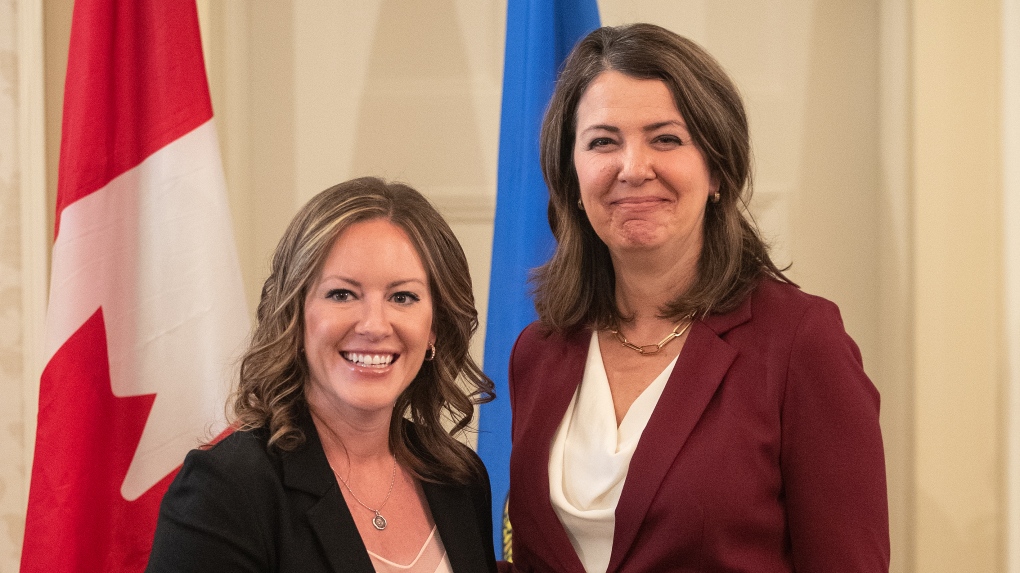Alberta minister says federal strings on electricity climate funding a 'threat'
 Alberta Premier Danielle Smith and Minister of Environment and Protected Areas Rebecca Schulz stand together during the swearing in of her cabinet, in Edmonton, Friday, June 9, 2023. THE CANADIAN PRESS/Jason Franson.
Alberta Premier Danielle Smith and Minister of Environment and Protected Areas Rebecca Schulz stand together during the swearing in of her cabinet, in Edmonton, Friday, June 9, 2023. THE CANADIAN PRESS/Jason Franson.
EDMONTON — Ottawa is threatening the provinces by suggesting it will withhold federal funding from electricity projects that don't reduce greenhouse-gas emissions, says Alberta's minister of environment and protected areas.
"We see (Federal Energy and Natural Resources Minister Jonathan) Wilkinson saying it isn't his style to have fights and wanting to work with the provinces and have a national conversation," Rebecca Schulz said Tuesday.
"Announcing in a press conference a threat to withhold funding isn't really the right way to start a conversation."
Earlier Tuesday in Vancouver, Wilkinson said billions of dollars in tax credits and grants will be tied to progress toward Ottawa's target for a net-zero electricity grid by 2035.
"To access the tax credit will require that we are moving in the direction of a non-emitting grid," he said.
That's an ultimatum, said Schulz.
"Starting out from a position like that is not the way to enter a discussion in good faith."
Saskatchewan's minister for SaskPower, Don Morgan, said the federal position will increase electricity costs.
"By withholding the very funding meant to help provinces reach the Trudeau government's net-zero targets, Saskatchewan's customers will see a dramatic impact on their rates," he said in a statement.
Neither Saskatchewan nor Alberta say they can meet the 2035 goal, preferring to set it off until 2050.
Wilkinson said provinces will be afforded flexibility in how they achieve the earlier target.
"We are cognizant of the need for the regulations to provide sufficient flexibility," he said. "Every province and territory has different needs."
He said talks between Ottawa and the provinces have already begun, including with Alberta Premier Danielle Smith.
Blake Schaffer, an energy economist at the University of Calgary, said much will depend on exemptions granted within the regulations, which are expected to be released this month. He said Canada's rules are expected to be similar to those in the United States.
"Both Canada and the U.S., when they talk about clean power, both have in their plans very significant carve-outs and exemptions to recognize the need for flexibility," he said.
The U.S., for example, contains provisions to allow old power plants to run out their life as well as for fossil fuel generation that only runs occasionally.
"From everything I'm hearing, (Canada's) similarly contains much-needed flexibility."
Schaffer said Canada's rules could contain carve-outs for industrial facilities that generate their own power from waste heat -- a big slice of Alberta's power generation.
Meeting the federal 2035 target will be a stiff challenge, said Schaffer. But not necessarily impossible.
"You haven't even heard what the final terms are yet," he said.
Provinces, especially those with emissions-heavy grids, have much at stake. An analysis from Clean Energy Canada, a clean energy think tank at Simon Fraser University, has calculated that those jurisdictions are in line for a third more funding than those provinces that have cleaner power.
The group also said provinces with non-fossil-fuel-powered grids tend to have lower and more stable power prices.
This report by The Canadian Press was first published Aug. 8, 2023.
CTVNews.ca Top Stories

BREAKING PM Trudeau says he thinks Trump is using talk of Canada becoming 51st state to distract from tariff impact
Prime Minister Justin Trudeau says he thinks U.S. president-elect Donald Trump is drumming up drama on Canadian statehood to detract from tariff talks.
LIVE UPDATES Here's the latest on the most destructive fire in L.A. County history
A series of wildfires are tearing through densely populated parts of the Los Angeles, Calif. area. Five people have been reported dead. U.S. Gov. Gavin Newsom says thousands of resources have been deployed to contain the fires.
More than 150 students sick at University of Guelph, says public health
More than 150 cases of gastroenteritis have been reported at the University of Guelph.
Multiple Chinese warships track Canadian HMCS Ottawa through the South China Sea
The silhouettes of a hulking Chinese Navy destroyer dubbed 'Changsha' and a warship called the 'Yuncheng' can been seen hovering along the horizon, mirroring HMCS Ottawa’s movements.
Canadian travellers now require an ETA to enter U.K. Here's what to know
Starting Jan. 8, Canadians visiting the U.K. for short trips will need to secure an Electronic Travel Authorization (ETA) before boarding their flight, according to regulations set out by the U.K. government.
'True when I said it, true today': former Canadian PM Harper pushes back against Trump on social media
Former prime minister Stephen Harper doesn’t find U.S. president-elect Donald Trump’s jibes about Canada becoming the 51st U.S. state very amusing.
Toronto police investigating parental abduction, three-year-old boy believed to be in India
A parental abduction investigation is underway after a father allegedly failed to return to Canada with his three-year-old son after a trip to India, Toronto police say.
California's insurance is in crisis. The solution will cost homeowners a ton
Lynne Levin-Guzman stood in the front yard of her 90-year-old parents’ home in Los Angeles County, California, trying to protect it with a garden hose — because their insurance company no longer would.
As wildfires rage in Los Angeles, Trump doesn't offer much sympathy. He's casting blame.
As cataclysmic wildfires rage across Los Angeles, President-elect Donald Trump hasn't been offering much sympathy. Instead, he's claiming he could do a better job managing the crisis, spewing falsehoods and casting blame on the state's Democratic governor.

































